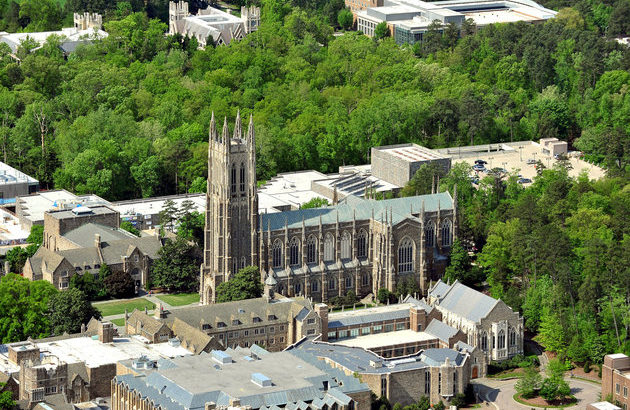HuffpostCollege/18/04/2016/Por: Tyler Kingkade
Resumen: Tres altos administradores de la Universidad de Duke, pidieron este lunes la derogación completa de la polémica ley HB 2, por ser considerada transfóbica. «Deploramos en los términos más enérgicos la nueva ley estatal, HB2, que impide que los municipios establezcan las leyes que protegen a los miembros de la comunidad gay y otras personas de la discriminación y elimina algunas oportunidades de progreso económico para estas comunidades, dijo un comunicado atribuido al presidente de Duke Richard Brodhead, rector de Sally Kornbluth y CEO de Duke University Health System A. Eugene Washington. Los administradores de Duke, una institución privada, en Durham, Carolina del Norte, están sufriendo económicamente, con algunos investigadores y profesores que no pueden viajar a sus escuelas debido a la ley, y los futuros estudiantes y profesores podrían alejarse del estado debido a la HB 2. La ley HB 2 prohíbe a las ciudades establecer sus propias leyes contra la discriminación, y requiere que las instituciones públicas – como el campus de la Universidad de Carolina del Norte – se les prohiba el uso de los baños
a personas trans que no se alinean con el sexo en sus certificados de nacimiento. En otras palabras, un estudiante que fue asignado al nacer femenina, pero que identifica y presenta a sí mismo como varón, tendrían que usar los baños y vestuarios de las mujeres. UNC ha dicho que no tiene ni idea de cómo hacer cumplir esto. Algunas de las más grandes corporaciones, incluyendo Bank of America, Facebook y Apple, tienen campañas unidas que critican la nueva ley, mientras que los alcaldes de San Francisco, Seattle y Nueva York, y el gobernador de Nueva York, han prohibido los viajes de empleados con fondos públicos a Carolina del Norte en protesta. Como resultado de esta ley, Carolina del Norte ya ha sufrido daños en su reputación nacional e internacional como un líder en el tratamiento justo de sus ciudadanos», dijeron los líderes de Duke.
Noticia original:
The renowned university says HB 2 is causing prospective students and
professors to avoid its campus.
Three top administrators at Duke University on Monday called for the full
repeal of HB 2, a controversial law widely denounced as transphobic.
“We deplore in the strongest possible terms the new state law, HB2, that
prevents municipalities from establishing laws that protect members of the
LGBTQ+ community and others from discrimination and eliminates some
economic advancement opportunities for underrepresented communities,” said a
statement attributed to Duke President Richard Brodhead, provost Sally Kornbluth and Duke
University Health System CEO A. Eugene Washington.
The Duke administrators went on to say that the school, a private
institution in Durham, North Carolina, is suffering economically, with some
researchers and professors unable to travel to their campus due to the law,
and prospective students and faculty suggesting they may steer clear of the
state due to HB 2.
It’s rare for an elite university to speak against a specific law the way
Duke is doing here. But a number of other private colleges and universities
in the state have already come forward to criticize the statute.
HB 2 prohibits cities from establishing their own anti-discrimination laws,
and requires public institutions — like the University of North Carolina
campuses — to bar trans people from using bathrooms that do not align with
the sex on their birth certificates. In other words, a student who was
assigned female at birth, but who identifies and presents himself as male,
would have to use the women’s restroom and locker rooms. UNC has said it
has no idea how to enforce this.
Some of the country’s biggest corporations, including
Bank of America, Facebook and Apple, have joined campaigns criticizing the
new law, while the mayors of San Francisco, Seattle and New York City, and
the governor of New York, have banned publicly funded employee travel to
North Carolina in protest. The NBA is keeping the All-Star game in the
state for now, but said the law is “problematic.”
“As a result of this law, North Carolina has already suffered damage to its
national and international reputation as a leader in the fair treatment of
its citizens,” the Duke leaders said.
“The economic and material impact is being felt across the state in many
ways, including at universities,” they continued. “Scholars from states and
municipalities that have imposed bans on government travel to North
Carolina have been unable to travel to Duke to continue vital ongoing
research partnerships or attend academic conferences. Prospective students,
faculty and staff, as well as Duke alumni planning visits to campus, have
voiced concerns about whether they will find a hospitable environment in
North Carolina. These developments have the potential to limit the value
that Duke and other colleges and universities contribute to the state,
namely producing trained graduates and expanding the frontiers of
knowledge.”
The University of North Carolina at Chapel Hill has voiced similar concerns,
stating that prospective students, faculty and researchers are avoiding
coming to the state and current and prospective donors are reconsidering
their financial support to the school.








 Users Today : 15
Users Today : 15 Total Users : 35459610
Total Users : 35459610 Views Today : 41
Views Today : 41 Total views : 3418013
Total views : 3418013